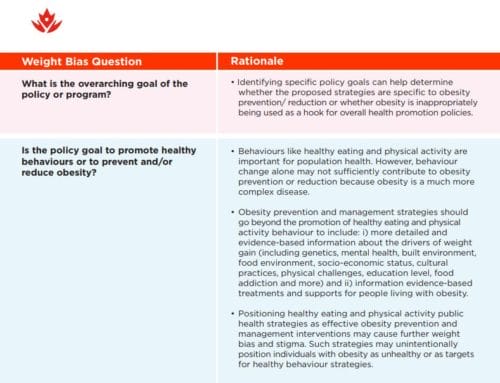To more closely examine the problematic nature of “healthy weight”[1] social messages, it is important to consider whether or not everyone who has a large body has obesity. It is a common belief that obesity is defined by examining a person’s body weight in relation to their height – by calculating their body mass index (BMI). Individuals with a BMI over 30 tend to be regarded as having obesity. But is this perspective accurate, current, and supported by evidence?
Obesity researchers have noted that not everyone who has a large body is unhealthy[2]. These researchers found that, when looking at important markers of health such as blood pressure and cholesterol, many individuals with large bodies were healthy. This led to a change in the definition of obesity as a chronic disease, where a high body weight negatively impairs health[3]. Thus, not everyone with a large body has obesity. Despite this, difficulty in changing the understanding of obesity, among the general population, researchers, and health professionals alike, has persisted. Why? Perhaps because evidence that demonstrates that people can be healthy at any body size is in direct opposition to “healthy weight” messages in our society.
In addition to the belief that lower body weights are the healthiest, “healthy weight” social messages also communicate that people are responsible for modifying their behaviours to achieve a “healthy weight”1. To do this, individuals often turn to the diet pills, fad diets, and popular exercise programs in attempts to lose weight. Given that the diet industry is a multi-billion dollar per-year business[4], it is fair to wonder – does it work? And, more importantly, is it healthy?
Researchers examining the long-term sustainability of weight loss have found that only about 5% of people maintain significant weight loss over the long term[5]. Further, yo-yo dieting can negatively affect the body’s metabolism and increase an individual’s body weight, resulting in increased yo-yo dieting[6]. Finally, efforts to lose weight are potentially harmful and can develop into extreme dieting behaviours (i.e., severe calorie restriction, excessive exercise, purging behaviour) and eating disorders – both of which have serious mental and physical health consequences[7]. These risks highlight how potentially harmful the belief that health equals weight can be for individuals of all body sizes.
References:
[1] Rodgers, R. F. (2016). The role of the “healthy weight” discourse in body image and eating concerns: An extension of sociocultural theory. Eating Behaviors, 22(August 2016), 194-198. https://doi.org/10.1016/j.eatbeh.2016.06.004
[2] Phillips, C. (2016). Metabolically healthy obesity across the life course: Epidemiology, determinants, and implications. Annals of the New York Academy of Sciences, 1391, 89-100. doi:10.1111/nyas.13230
[3] Sharma, A. M., Goodwin, D. L., & Causgrove Dunn, J. (2018). Conceptualizing obesity as a chronic disease: An interview with Dr. Arya Sharma. Adapted Physical Activity Quarterly, 35, 285-292. doi:10.1123/apaq.2017-0193
[4] PR Newswire. (2019, February 27). United States weight loss & diet control market report 2019: 2018 results and 2019-2023 forecasts. Retrieved from: https://www.prnewswire.com/news-releases/united-states-weight-loss–diet-control-market-report-2019-2018-results–2019-2023-forecasts—top-competitors-ranking-with-30-year-revenue-analysis-300803186.html
[5] Nordmo, M., Danielsen, Y. S., Nordmo, M.(2020). The challenge of keeping it off: A descriptive systematic review of high-quality, follow-up studies of obesity treatments. Obesity Reviews, 21, e12949. doi:10.1111/obr.12949
[6] Dullo, A. G., & Montani, J.-P. (2015). Pathways from dieting to weight regain, to obesity and to metabolic syndrome: An overview. Obesity Reviews, 16, 1-6. doi:10.1111/obr.12250
[7] Haynos, A. F., Wall, M. M., Chen, C., Wang, S. B., Loth, K., & Neumark-Sztainer, D. (2018). Patterns of weight control behavior persisting beyond young adulthood: Results from a 15-year longitudinal study. International Journal of Eating Disorders, 51, 1090-1097. doi:10.1002/eat.22963




